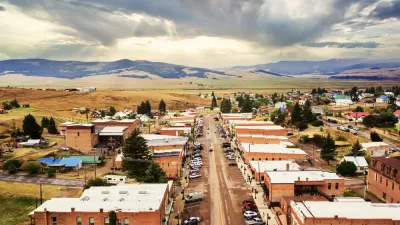To accomodate America's expected population growth by 2050, the country will need to build up to 74 million new homes. This challenge presents a unique opportunity to reshape our urban environment, says Enrique Penalosa, the former mayor of Bogota.
"It is unlikely that city building on the scale to be seen through 2050 will happen ever again," says Penalosa. "Cities are a means to a way of life: the kind of urban structures created over the next few decades will have profound consequences in terms of quality of life, environmental sustainability, economic well-being, and even happiness and the civilization for hundreds of years to come. If we consider the influence American cities will exert on the rest of the world, the way they are built will determine, as well, much of the world’s sustainability and well-being."
Can high-density infill or traditional neighborhood development provide the model? "I don’t think so," he argues. "I believe a different urban model is possible: a dense city with a large percentage of buildings facing pedestrian-and-bicycle-only promenades or greenways."
FULL STORY: A U.S. Template for a Third-Millennium City

Maui's Vacation Rental Debate Turns Ugly
Verbal attacks, misinformation campaigns and fistfights plague a high-stakes debate to convert thousands of vacation rentals into long-term housing.

Planetizen Federal Action Tracker
A weekly monitor of how Trump’s orders and actions are impacting planners and planning in America.

In Urban Planning, AI Prompting Could be the New Design Thinking
Creativity has long been key to great urban design. What if we see AI as our new creative partner?

King County Supportive Housing Program Offers Hope for Unhoused Residents
The county is taking a ‘Housing First’ approach that prioritizes getting people into housing, then offering wraparound supportive services.

Researchers Use AI to Get Clearer Picture of US Housing
Analysts are using artificial intelligence to supercharge their research by allowing them to comb through data faster. Though these AI tools can be error prone, they save time and housing researchers are optimistic about the future.

Making Shared Micromobility More Inclusive
Cities and shared mobility system operators can do more to include people with disabilities in planning and operations, per a new report.
Urban Design for Planners 1: Software Tools
This six-course series explores essential urban design concepts using open source software and equips planners with the tools they need to participate fully in the urban design process.
Planning for Universal Design
Learn the tools for implementing Universal Design in planning regulations.
planning NEXT
Appalachian Highlands Housing Partners
Mpact (founded as Rail~Volution)
City of Camden Redevelopment Agency
City of Astoria
City of Portland
City of Laramie





























